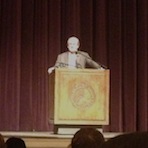Last night Anita, our intern Chris, and I went to see Salman Rushdie’s talk at Mackey Auditorium on the CU Boulder campus. Mr. Rushdie is eloquent and quotable. I was one finger typing furiously on my iPhone so as to share some kernel of ideas with my blog readers. Any inelegance in my paraphrasing of his talk last night is solely my fault.
His talk tackled what it is to be a writer in this world.
In a world where 24-hour news necessitates posting something about an event, even if it’s not entirely accurate and only later to be retracted, readers are hard-pressed to find “truthyness” in a lot of journalism these days.
The novel takes on a new form of accurate truthfulness that might be a more accurate reflection of what our world actually is. The novel becomes the depth of the lived experience and the writer is bringing to the public the socially important information that is missing from all other sources.
Rushdie mentioned that the novel, Orphan Master’s Son by Adam Johnson, which won the 2013 Pulitzer Prize for fiction just last week, is all we need to read to truly understand what is happening in North Korea.
And it is for this reason that when they come to power, tyrant and totalitarian regimes target artists and writers.
Rushdie went on to illuminate that we, as people, understand ourselves through the telling of stories. We have the right to tell story our way, through our beliefs, and about our nation. And those stories are a continuing dialogue. Unfree nations try to control the narrative. Not to have freedom to tell stories is true unfreedom.
The job of the writer, as it is for all the great arts, is to open the universe.
Tyrants close the world. A writer’s job is to open it.
Amen.


I just LOVE this. Thank you for sharing your notes!
Pingback: UpcoThe Valley of Amazementming book releases! | The Salonièrre's Apartments
Pingback: Writing Advice and Other Insights from Salman Rushdie | Word Café
Pingback: My Homepage
I’d never thought about books this way, but it’s absolutely true. Breaking stories blast across TV and the Internet, then corrections blast across, then corrections of corrections. And just when we’re wrapping our heads around what actually happened, another story breaks. No matter how wonderful or tragic the story is, it’s hard to connect. There’s just too much coming at us all at once.
With books, we enter a different reality for hours and hours on end. This allows us to connect with the characters, with their story, in a way that provides a fuller understanding, instead of just an intellectual one.
Thanks for posting this.
I once read and article on “research” and the author stated something to the effect that all you need to know about the Tudor dynasty could be gained from watching The Tudor’s on Showtime. That may be a wee bit crass, but truthfully, I did connect more than I ever have with the multitude of faces that belong that era. Storytelling is how we share history and important things. And important things are things that we must feel with all our senses. Novels do this.
Pingback: Upcoming book releases! The Salonniere's Apartments